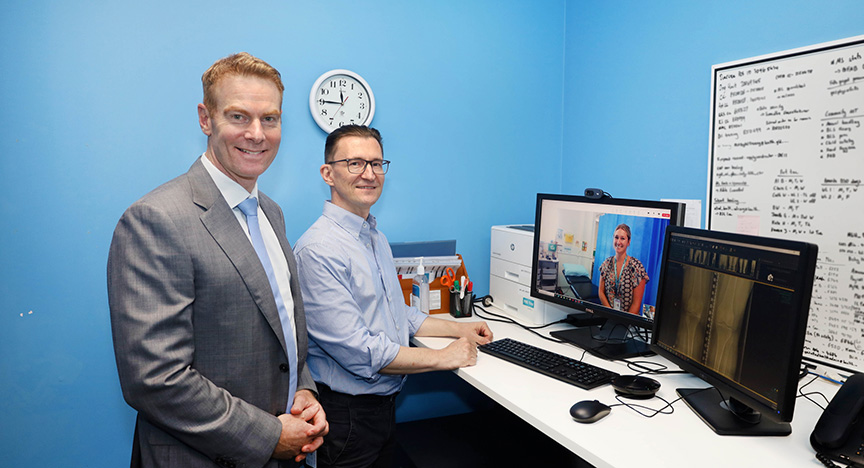
Regional orthopaedic outpatients on the wait list are now accessing virtual support thanks to a new Telehealth Clinic partnership with QEII.
Six months of consultation and advocacy led by Director of Medical Services, Dr Chris Bell saw the Telehealth Clinic launch on 1 February.
The North West Hospital and Health Service (NW HHS) partnership is based at Mount Isa Hospital, where regional outpatients are virtually connected with orthopaedic and allied health specialists at QEII.
Dr Bell says the pilot will address a gap in specialist availability in the region and ease mounting pressure on regional waitlists by adopting a model similar to QEII’s successful Musculoskeletal Management Clinic (MMC).
“Mount Isa has a significant category three orthopaedic waitlist and doesn’t have an orthopaedic service, which has created a backlog of waitlisted outpatients. We determined we could help reduce that backlog through virtual assessment, adopting some of those methods that have been successful in our clinics,” he said.
With the focus on triaging patients between surgical and non-surgical treatment pathways, the QEII team virtually assesses patients while local allied health professionals facilitate telehealth appointments.
“Before the MMC clinic, QEII would take referrals straight from the community, but we found that only one in ten patients was suitable for surgery, whereas the other nine were either not suitable for medical reasons or had a condition that could be improved with allied health intervention. Changing our approach has done wonders for our waitlist at QEII,” said Dr Bell.
“By adopting that same lens to Mount Isa, where they have a whole suite of underutilised allied health resources, we can help them see those community referrals with some support from the extended scope of practitioners that we have here.”
Clinical Lead Physiotherapist Stuart McCaskill leads the virtual clinic, where he assesses, diagnoses and develops management plans for orthopaedic outpatients.
“Patients are then either placed on a surgical waitlist or referred to our Conservative Management Service, which consists of physiotherapists, dieticians, psychologists and pharmacists,” Stuart explained.
With a promising start to the clinics and goals to develop the surgical consultation aspect of the service, the early success of the Telehealth Clinic is resonating with patients while underscoring the invaluable reach of the service.
“Patients are so grateful for the assessment and care that we’ve been able to give them, because it gives them a path forward,” said Stuart.
“Ultimately, the aim is to not have any long wait issues in the NW HHS, which is very achievable when you see the volume of referrals is not very high. Once we’ve cleared the backlog, what we hope is those patients can get timely treatment and access to the full suite of specialties just like anyone else in Metro South does,” added Dr Bell.
“I hope this is a proof of concept for other regional centres in Queensland that face similar challenges. From a surgical perspective, I want telehealth to become a very integrated part of how we run our clinics, so we can open the door for those communities to access the same treatment as any other Queenslander.”